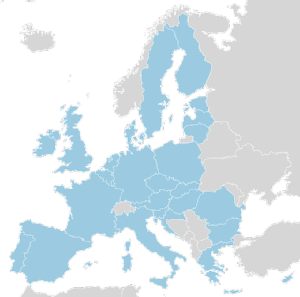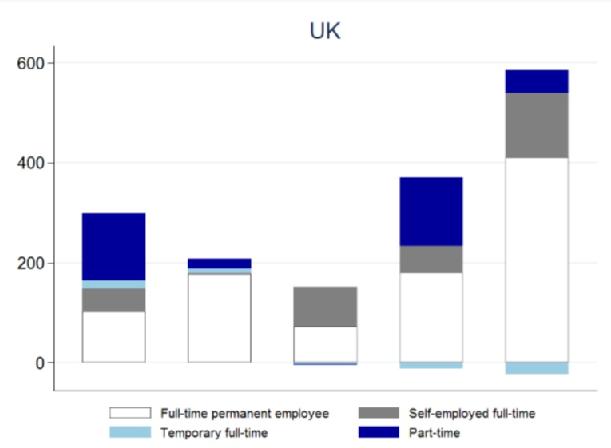IER News & blogs
Involuntary non-standard employment in Europe
 Professor Anne Green (IER) and Dr Ilias Livanos (Cedefop) have an article on Involuntary Non-Standard Employment in Europe published in the April 2017 issue of European Urban and Regional Studies. The journal article outlines how In some countries in Europe the economic crisis starting in 2008 was marked not only by a rise in unemployment, but also by increases in individuals in part-time and temporary working, so emphasising the need to examine employment composition as well as non-employment. The promotion of non-standard forms of employment – such as part-time and temporary working – has been part of Europe’s employment agenda, but directives have also focused on raising the quality of such work.
Professor Anne Green (IER) and Dr Ilias Livanos (Cedefop) have an article on Involuntary Non-Standard Employment in Europe published in the April 2017 issue of European Urban and Regional Studies. The journal article outlines how In some countries in Europe the economic crisis starting in 2008 was marked not only by a rise in unemployment, but also by increases in individuals in part-time and temporary working, so emphasising the need to examine employment composition as well as non-employment. The promotion of non-standard forms of employment – such as part-time and temporary working – has been part of Europe’s employment agenda, but directives have also focused on raising the quality of such work.
Using European Union Labour Force Survey data, Anne and Ilias construct an indicator of involuntary non-standard (part-time and temporary) employment (INE) , depicting a negative working condition. Descriptive analyses show important differences between countries in the incidence of INE, which is highest in Spain, Portugal and Poland, and also in the composition of INE. By contrast, INE tends to be lower in countries with Anglo-Saxon and Nordic welfare state models. Econometric analyses reveal that young workers, older workers, women, non-nationals, those with low education and those who were unemployed a year ago are at greatest risk of INE.
Green, A. and Livanos, I. (2017). Involuntary non-standard employment in Europe. European Urban and Regional Studies, 24(2), pp. 175–192. DOI: 10.1177/0969776415622
UK employment policy in a changing EU
 As part of the Warwick's faculty of social sciences CREW network, IER, the Law School and the Industrial Relations Research Unit have an award from the Higher Education Innovation Fund to produce a series of Brexit Briefings on Employment. The four thematic briefings will focus on job loss and job creation; training for the unemployed; employment rights and regulation; migration and skills. Each will present key research evidence and make recommendations for the development of new policy as the UK exits the EU. Each will also have a public launch over May-July this year.
As part of the Warwick's faculty of social sciences CREW network, IER, the Law School and the Industrial Relations Research Unit have an award from the Higher Education Innovation Fund to produce a series of Brexit Briefings on Employment. The four thematic briefings will focus on job loss and job creation; training for the unemployed; employment rights and regulation; migration and skills. Each will present key research evidence and make recommendations for the development of new policy as the UK exits the EU. Each will also have a public launch over May-July this year.
For further information, contact Professor Chris Warhurst, Dr Ania Zbyszewska or Professor Guglielmo Meardi at ier at warwick dot ac dot uk
MOOC on the changing world of work
 Are you prepared for the challenges of the changing labour market? Do you want to better understand and apply skills related to emotional awareness, active listening, reflection, coaching skills, peer coaching and powerful questioning? Do you want to explore tools for handling labour market information (LMI) and the digital agenda? The 'Changing World of Work' MOCC (Massive Open Online Course) is a 6 week course with an estimated workload of 3.5 hours per week. The course has been developed as part of the EmployID project which has received funding from the European Union’s Seventh Framework Programme for research, technological development and demonstration under grant agreement no. 619619. IER and Associate staff involved in course delivery: Jenny Bimrose, Alan Brown, Rachel Mulvey, Deirdre Hughes and Graham Attwell. For more information register now.
Are you prepared for the challenges of the changing labour market? Do you want to better understand and apply skills related to emotional awareness, active listening, reflection, coaching skills, peer coaching and powerful questioning? Do you want to explore tools for handling labour market information (LMI) and the digital agenda? The 'Changing World of Work' MOCC (Massive Open Online Course) is a 6 week course with an estimated workload of 3.5 hours per week. The course has been developed as part of the EmployID project which has received funding from the European Union’s Seventh Framework Programme for research, technological development and demonstration under grant agreement no. 619619. IER and Associate staff involved in course delivery: Jenny Bimrose, Alan Brown, Rachel Mulvey, Deirdre Hughes and Graham Attwell. For more information register now.
Bad jobs, the bad jobs trap and the Brexit vote
Despite all of the talk about inter-generational betrayal by the old of the young, the largest ratio to vote leave was amongst low-skilled workers (70%). Their frustration and desire for something to change is understandable. They are in bad jobs, are too often stuck in these jobs and jostle more in these jobs with migrant workers. Their situation is a symptom of three developments that have occurred in the UK labour market since the economic crisis. First, job polarisation has consolidated. Second, non-standard employment has increased in the worst jobs. Third, UK-born workers have benefitted less from employment restructuring.
Levels of skill and pay are linked. Using pay as a proxy for job quality then dividing the pay range of jobs into quintiles and charting the expansion and contraction of the number and proportion of jobs in each quintile over time, Eurofound has been assessing employment restructuring across the EU. In Table 1 below, Quintile 1 on the left represents the bottom fifth of jobs by pay, Quintile 5 on the right the top fifth. It shows the polarisation of jobs in the UK over 2011-15 and how most jobs created in the bottom quintile are part-time, temporary or self-employment. Without a decent or solid wage floor, one consequence is that it is more difficult for these workers to plan their lives.
Table 1: Net employment change by job-wage quintile, decomposed by employment type, UK 2011-15 (1000s)

Source: Eurofound (2015)
Being in bad jobs is compounded by the lack of opportunity for many of these workers to escape into better jobs. By 2015 just over 10% of the UK workforce was not born in the UK. Further data from Eurofound shows these workers spread across the quintiles over 2011-15, but the largest proportion was employed in the bottom quintile – accounting for just over 20% of workers in this quintile. Across the EU generally, native workers have tended to shift from the lower quintile jobs; by contrast in the UK many native workers continue to work in these jobs. A bad jobs trap thus exists for many UK-born workers which also means that, disproportionality, they work alongside more migrant workers. From their perspective, things are unlikely to get any better any time soon for these UK-born workers.
Theresa May has promised to address the plight of these workers, saying that she is listening to their frustrations. A good place to start would be to introduce polices that offer employment enrichment that improves job quality and provides springboards out of bad jobs.
This blog draws on material from Chris Warhurst’s Accidental tourists: Brexit and its toxic employment underpinnings, Socio-Economic Review, 14(4): 819-825, 2016, and is one of a number of articles in the journal debating the factors associated with Brexit.
New directions in employment policy
New report for the Public Policy Institute for Wales identifies ways of harnessing employment opportunities in growth sectors in order to encourage the creation of sustainable employment opportunities which offer prospects for career progression.
Williams E. and Green A. (2016) New Directions in Employment Policy. Cardiff: PPIW.
